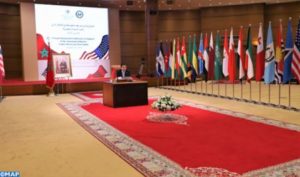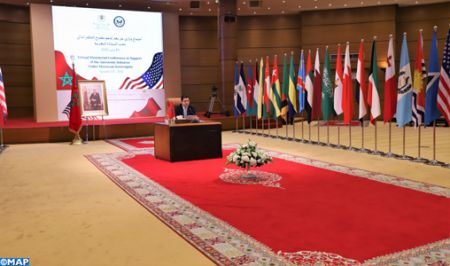 A Ministerial Conference on the Morocco-proposed Autonomy Initiative, held virtually on Friday, at the invitation of Morocco and the United States, expressed strong support for this initiative as the only basis for a just and lasting solution to the Sahara regional dispute.
A Ministerial Conference on the Morocco-proposed Autonomy Initiative, held virtually on Friday, at the invitation of Morocco and the United States, expressed strong support for this initiative as the only basis for a just and lasting solution to the Sahara regional dispute.
The representatives of forty countries, including 27 ministers, who took part in the conference committed to continue their advocacy for a solution, using Morocco’s autonomy plan as the sole framework for resolving the Sahara dispute.
The Conference was co-chaired by Moroccan Foreign Minister Nasser Bourita and US Assistant Secretary of State for Near Eastern Affairs David Schenker.
According to a Chairs summary made public at the end of the Conference, participants welcomed the development endeavors launched in the region including in the framework of Morocco’s “New Development Model for the Southern Provinces.”
In his address before the conference, Bourita actually shed light on the new development model for the southern provinces as a concrete step that paves the way for the autonomy status of the Sahara in addition to the democratic and orderly election of representatives of the Sahara territory.
At the geopolitical level, the autonomy proposal is conducive for economic and security cooperation in the Maghreb as well as African stability and prosperity, Bourita said, adding that Morocco remains committed to the political process and backs the endeavor of the UN Secretary General to appoint a new Personal Envoy. Meanwhile, he said “other parties continue to hinder” these efforts and continue to violate the 1991 ceasefire agreement.
Most participants recalled the Proclamation of the United States of America of December 10, 2020, entitled “Recognizing the Sovereignty of the Kingdom of Morocco over Western Sahara,” which reaffirmed support for Morocco’s autonomy proposal as serious, credible, and realistic and as the only basis for a just and lasting solution to the dispute.
Schenker said in his opening remarks that the US recognition of
“Moroccan sovereignty over Western Sahara makes clear our view that Morocco’s autonomy proposal is the only basis for a just and lasting solution to the conflict.”
He called on the international community to back the autonomy plan as “the only credible and realistic basis for negotiations.”
“After nearly three decades of the status quo failing to produce a breakthrough, let us seize this moment to reinvigorate negotiations within the framework of Morocco’s autonomy plan,” he said.
The participants in the conference also underlined that the US Presidential Proclamation provides guidance for efforts to advance the UN-exclusive political process aiming at reaching a lasting political solution, with the autonomy initiative as the only realistic basis for such a solution. This Proclamation will strengthen the international consensus in support of the UN-exclusive political process.
Speaking at the same event, foreign ministers of the UAE, Bahrain, Gambia, Guinea, Zambia, Haiti, Guinee, Togo, Guatemala, Antigua and Barbuda expressed backing to Morocco’s territorial integrity and to the autonomy plan as the only political solution to the Sahara issue that would contribute to regional peace and stability.
Other countries that attended the conference in support of the autonomy plan as the sole political solution are Comors, Guinea Bissau, Equatorial Guinea, Malawi, Liberia, Sao Tome and Principe, Benin, Saint Lucia, the Dominican Republic, Barbados, Jamaica, Maldives, Salvador, Senegal, Saudi Arabia, Cote d’Ivoire, Djibouti, Eswatini, DRC, Jordan, Oman, France, Egypt, Papua New Guinea, Tonga, Kuwait, Yemen and Burkina Faso.
The Conference also highlighted the decision of twenty United Nations Member States to open Consulates in the Moroccan cities of Laayoune and Dakhla, considering that such steps will promote economic and business opportunities for the region, strengthen the vocation of the Sahara region as an economic hub for the entire continent and advance progress towards reaching a long-awaited final political solution to this dispute, which has been going on for several decades.
